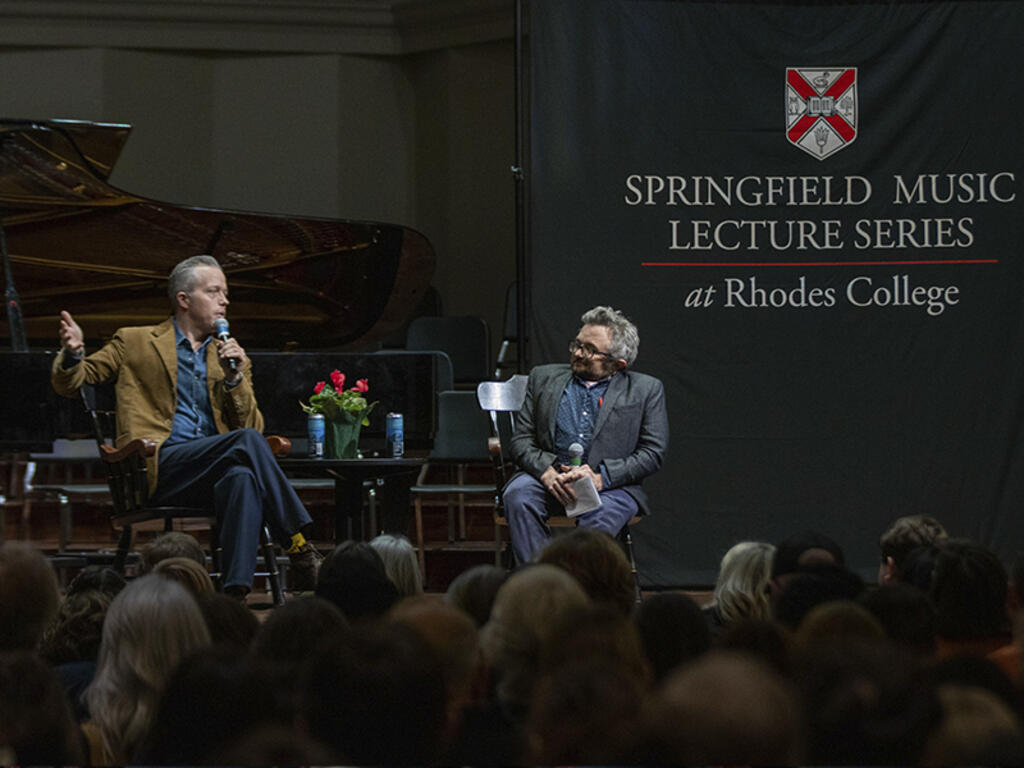A liberal arts education at Rhodes College inspires students to cultivate their interests and make an impact on Memphis. While every approach is different, members of the Rhodes faculty find ways to create engaging curriculums every semester that feed into that ethos, whether it’s the arts, science, or business. For a peek behind the classroom curtain this past semester, read on for three examples of how professors are educating both the head and the heart.
Songwriting in Memphis
The Mike Curb Institute for Music has opened doors to many different careers in the music industry. Frequently earning Rhodes recognition as a “Top Music Business School” by Billboard, the Curb Institute has provided students the opportunity to learn everything from sound editing to performing to marketing and community engagement. But John Bass, director of the Curb Institute, had noticed a growing interest in courses on songwriting, and felt the time was right to add that to the curriculum.
“We’ve done classes around production and songwriting in the past, but nothing that was fully dedicated to the practice of songwriting,” says Bass. “So, I took an idea for a course to Carole Blankenship, the chair of the Department of Music, and she was a big advocate for it.”
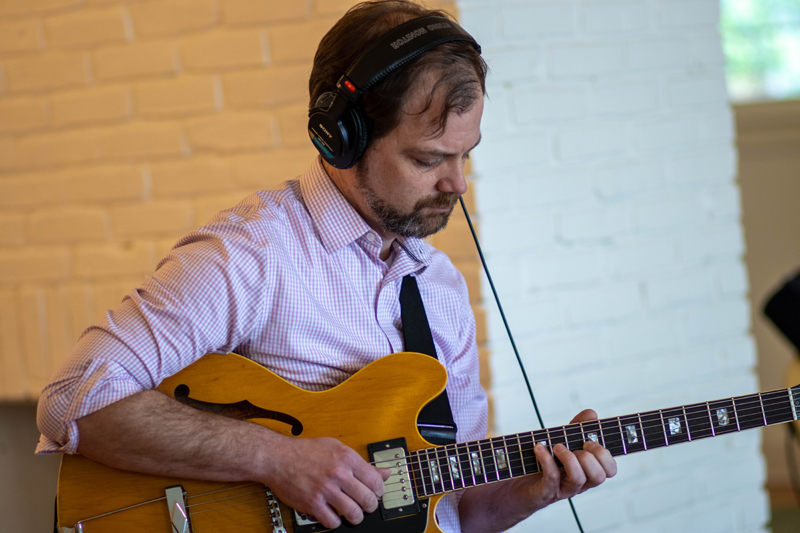
Songwriting in Memphis first hit the course catalogue in the spring of 2024. Over the course of a semester, students work on sharpening their creative process and building a constructive community with their classmates. “We have people from diverse backgrounds with different tastes in music,” says Bass. “As they go through this process together, they end up trusting each other and collaborating on their work. At a place like Rhodes, courses like this are about empowering people and giving them the skills to push forward with their ideas.”
Music major Zach Everett ’26 grew up singing church and gospel music, and in high school put out an album with his group Next Generation KC. In Songwriting in Memphis, he found he was able to hone in on his interest in soulful R&B. “That’s the genre I’ve always been interested in doing, and I really wanted to practice that here,” says Everett. “In the songwriting class, I’ve really been able to center my style and approach with the feedback I get from other students, and learn from their approaches, too.”
A big component of Curb Institute work is learning from professionals how they develop their craft, and Songwriting in Memphis is no exception. This semester, four-time Grammy Award-winning artist Jason Isbell came to campus as part of the 2024 Springfield Music Lecture Series, and also spoke to the Songwriting in Memphis class. Students engaged directly with Isbell as he talked about his approach to writing songs—such as “Cast Iron Skillet,” which garnered him American music’s most coveted accolade—and about maintaining an authentic identity around the process.
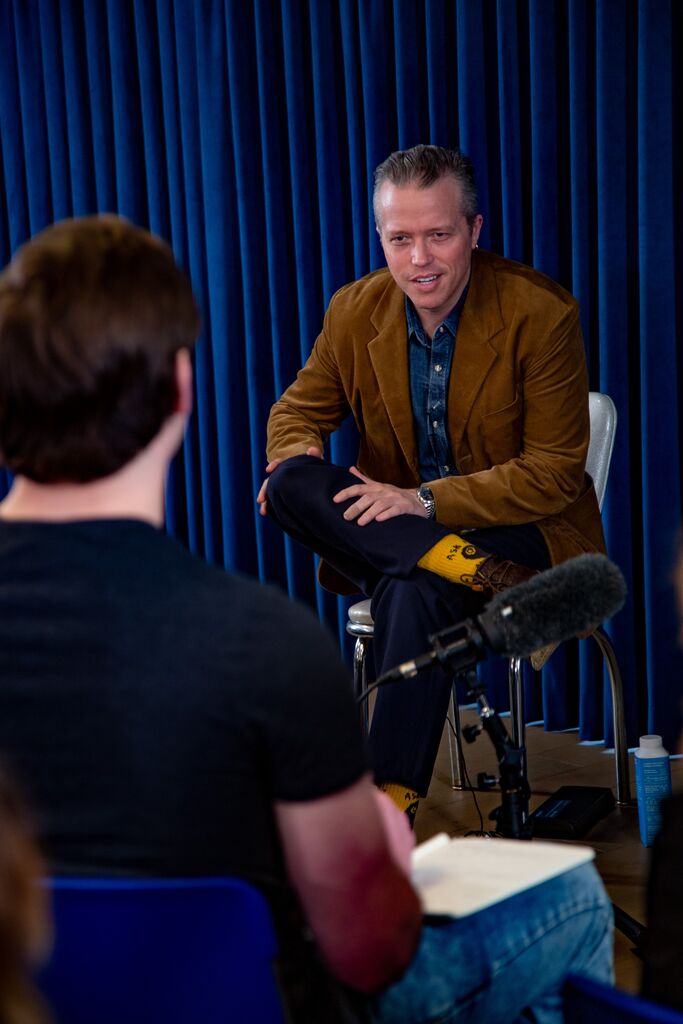
While putting together his curriculum for Songwriting in Memphis, Bass was able to focus on his own songwriting approach. Earlier this year, he released his first album, the multifaceted Nowhere in Between. The collaboration that he teaches about is on full display in the album, with tracks featuring plenty of local musicians, including Rhodes alumna Louise Page ’16.
“I remember one of the things Jason said is that being a songwriter is tough,” says Bass. “But if you want to be one, just go do it; go write a song. And that’s what we all did, building this cohort of trust and elevating all of our own skills together. The music community in our city is really strong, and part of this class, and the Curb Institute, is to shape this group into its own confident community that can go out into Memphis and share their craft.”
Solar Search
News of a near-total solar eclipse over Memphis had Rhodes buzzing, and various groups around campus worked to set up a viewing party on April 8 for faculty, staff, and the entire student body. But for members of the Rhodes Astronomy Club, the chance to see the full total eclipse was an opportunity they couldn’t wait for in the classroom.
Time was of the essence; this was their only chance to observe a total solar eclipse as students, since the next one visible in the United States won’t happen until August 23, 2044. Led by the chair of the Department of Physics, Ann Viano, the club booked three sites in Arkansas, Texas, and Indiana to ensure they had flexibility in case of cloud coverage or stormy weather. Eventually, the group settled on Morristown, IN.
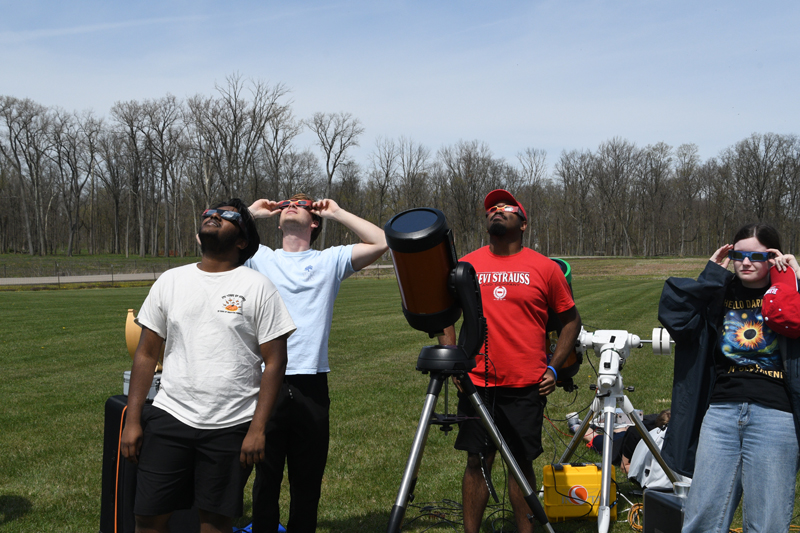
“We made our final decision two days before based on predictions of clear skies,” says Viano. “Our viewing was the RC plane field Blue River Air Park, home of the Indianapolis R/C Modelers. This field was just 1.6 miles from the exact center of the path of totality, and allowed us to have four full minutes of totality.”
Viano notes the importance of students traveling outside the classroom for experiences like this. Eclipses have many effects on the environment, and students had the opportunity to run unique tests. “Even viewing a partial eclipse is a great event that gives you a perspective on our small place in the universe,” says Viano. “Traveling to experience totality, however, allows you to see the sun’s corona, or outer atmosphere. This plasma is normally outshined by light from the sun’s visible surface, so the surface needs to be blocked in a total eclipse to see it. We also viewed sunset in every direction simultaneously during totality.
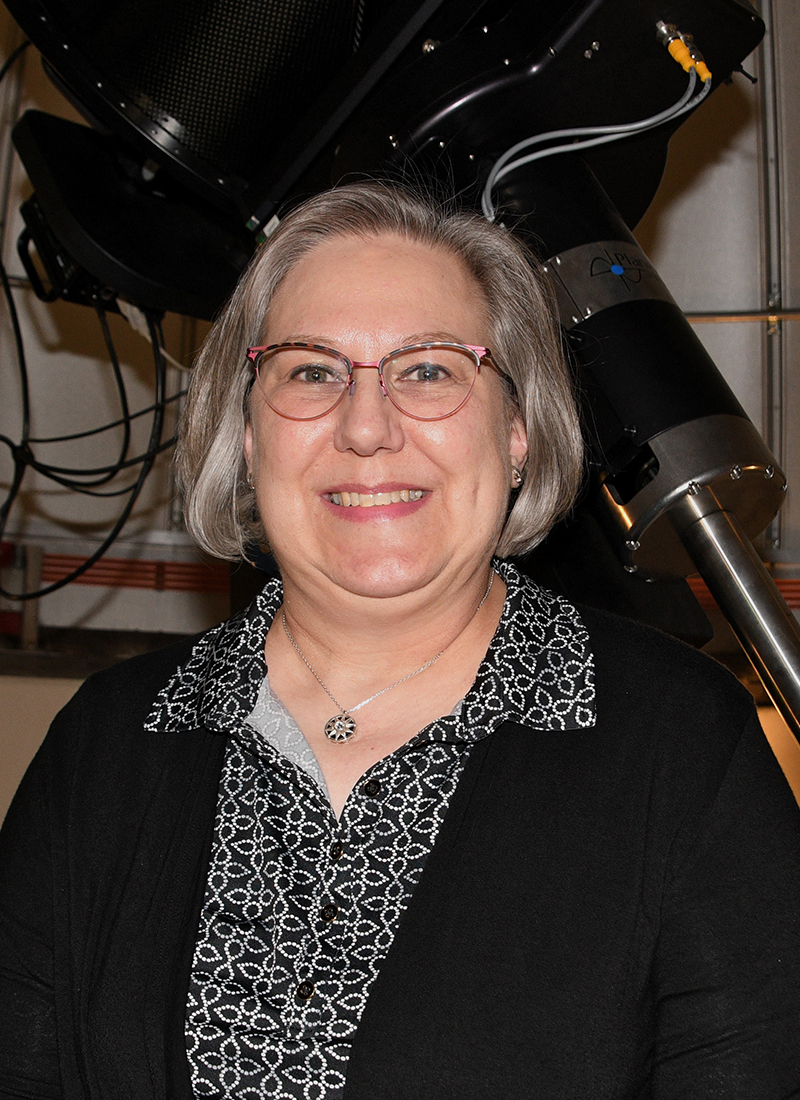
“The physics department has a long history of studying the shape and extent of the sun’s corona during total eclipses,” she adds. “During this most recent trip, several students captured photos or videos of the event and are busy processing their data.”
Club members also analyzed how animal behavior differs during an eclipse, with many critters beginning their nightly routines as early as 1:30 in the afternoon. “Many eclipse viewers discuss the behavior of animals during totality; animals tend to begin their nocturnal activities once the eclipse begins. At our viewing site, we heard crickets and tree frogs during totality like you would hear just after dusk.”
Back at campus, student volunteers hosted a viewing party above the Frazier Jelke Science Center by the Lynx statue, the whole area packed with undergraduates, faculty, and staff excited to see something different. Eclipse glasses were provided for safe viewing, while physics students set up telescopes and guided others through what they were seeing. And since this was a solar eclipse, boxes of moon pies were available for light snacking. For the physics department, this was a once-in-a-school-lifetime occurrence. Students from other disciplines also learned something new, and had a little fun while they were at it.
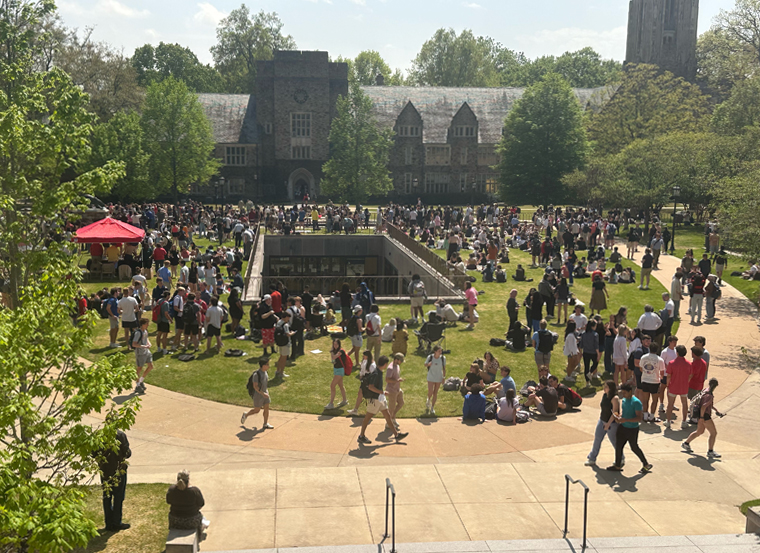
Taxation and the Working Poor
During tax season, low-income families run the risk of falling afoul of predatory tax preparers who take a huge chunk of their tax returns. For those living paycheck to paycheck, that can be devastating. Rhodes’ Taxation and the Working Poor class, taught for the last four years by Department of Business instructor Maggie Lovell, aims to fix that issue.
“This is a big issue in Memphis,” says Lovell. “So, our students train to become certified through the IRS’s VITA program, which is Volunteer Income Tax Assistance. As part of the class, they go into the community to prepare income-tax returns for low-income families and individuals. While part of the business department, it’s open to non-majors and we see a lot of interest from students who simply want to make an impact in the community.”
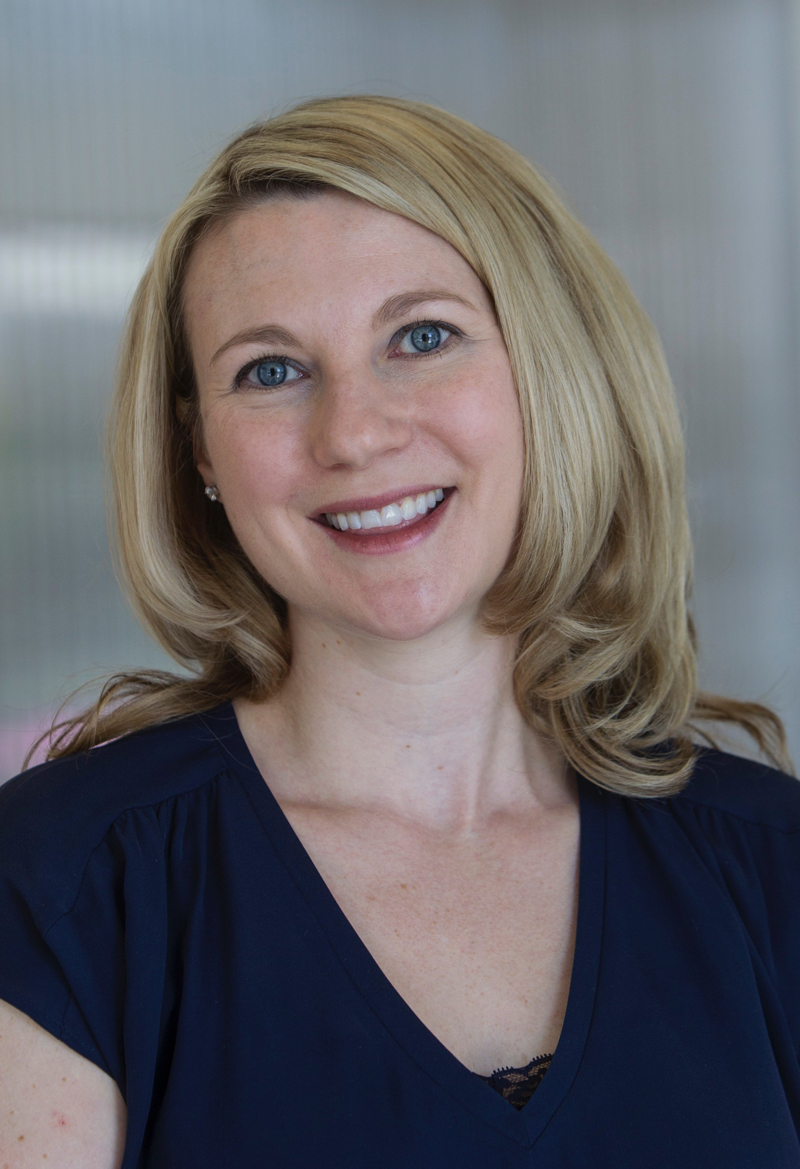
Outside of academic coursework, which explores different readings every week on issues related to the poverty cycle, students are required to complete 35 hours of service work over the course of the semester. This year, Rhodes partnered with nonprofit United Way of the Mid-South’s Free Tax Prep program. Run by program manager Matthew Hein ’15, the Free Tax Prep program has sites all over the city where volunteers and students spend time preparing tax returns. “Working as a volunteer with our Free Tax Prep program gives students valuable hands-on experience while aligning with Rhodes’ service-oriented culture,” says Hein. “Our program works with thousands of low-income individuals, providing a completely free community resource in the sensitive and often complex area of taxes.”
Lovell stresses how much the students gain from participating in the class. Beyond the coursework and useful services, the program provides an opportunity for students to get out of their circles and meet people from different backgrounds. “Our students sit down and actually get to know individuals in the community that they otherwise may not interact with,” she says. “They learn how to handle delicate situations when asking clients for sensitive information related to finances.”
While they may not realize it in the moment, those enrolled in Taxation and the Working Poor are helping to give large sums of money directly back to the community through their work. “Our program ensures that 100 percent of families’ refunds go directly into their pockets,” adds Hein. “This year we served over 9,600 families and returned over $11 million in refunds to the community. We truly made an impact on people who need assistance the most, as our average client had an income of under $30,000. Overall, clients saved over an estimated $2 million in preparation fees.”

